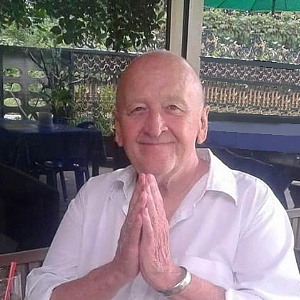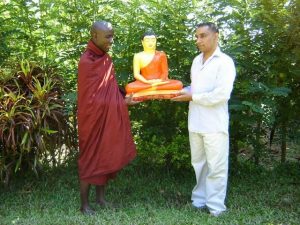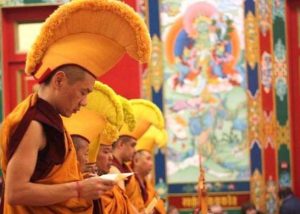
Rather than pointing our finger at others within our own socio-cultural environments and laying—perhaps well-deserved—blame, we should, collectively, as the silent majority, be coming to a common conclusion, which is that if we were each to work individually and independently on developing our own wholesome, internal, mental culture (Pali: citta-bhavana), our own mental culture and that of society as a whole could eventually become considerably and collectively improved, based on concurrently strengthening morality and enforcing law and order.
Criticizing others is likely to only arouse their resentment, enmity, and even hatred, causing them to act aggressively or covertly toward us, to harm and silence us, so it would be much wiser not to cause annoyance, which would be like tickling the whiskers of a tiger.
These unwholesome elements in our societies—the bad guys, such as corrupt administrative and political leaders—will, of course, always be there. Inevitably and inexorably, they will continue to characteristically seek to take advantage of others, both ignorantly and selfishly, both openly and secretly, plotting to increase their wealth and power and reinforce their personal “self-images” without a care for anybody but themselves, their cronies, and a flock of fellow-conspirators and accomplices who also need to be paid off.
It is not uplifting to the mind, however, to dwell on the selfish actions of others; negativity becomes a mental habit and saps our energy. So let us instead look at the problem from a more personal, individual perspective.
Quite paradoxically and rather ironically, we should start criticizing what is wrong in our society by looking at and within ourselves. From there, we can begin to strive diligently to correct the not-so-wholesome and perhaps despicable elements that we will, slowly but surely, begin to recognize within ourselves, and which are actually common to all of humanity, regardless of creed or culture or country.
Rather than asking what is wrong with today’s changing society and eroding culture, we ought first to ask: “What is wrong with me?” or “What is wrong with ourselves that we have become a small part of creating such an insufferable society, especially against the background of what may be called a pure and noble ancient cultural Dhamma tradition?”
One who remains passive is supporting the cause of the aggressor.

Why is it that the majority of people in lands that have long been primarily based on Buddhist culture in contemporary Southeast Asia and elsewhere around the world do not follow the Noble Eightfold Path in the way it was outlined by the Buddha, based on his understanding and the wisdom of the Dhamma?
Why are individuals not striving to be good citizens? Why are our people culturally conditioned to stand back passively and allow blatantly selfish rogues to acquire money and power unlawfully, and to go on feeding frenzy after feeding frenzy, continuously and relentlessly, in a way that undermines the ancient values of our highly revered culture, and is detrimental and deconstructive to the foundation of contemporary society?
Within society at large, we see attachments and worldly tendencies in the minds of people—from the rural poor to city street vendors; from merchants, business people, politicians, and corrupt tycoons alike. People are, far too frequently, like lotuses born in darkness and muck. They are causally dependent on their own ignorance and, thus, unfortunately and inevitably, blindly follow the immediate impulses of their own untrained, untamed bodies and minds. And they will continue to almost always pursue that which is advantageous for themselves, in the moment, before ever considering the wider good of others and of society at large. They are in darkness and do not yet know about the light. Is there not some way to change this?
The things that are wrong with our culture, on the whole, are to be found within the hearts of each and every individual citizen, whether rich or poor; whether wealthy, privileged, high-born, or conceived at the lowest of social levels.
In this cultural climate, we could all strive to look inward, to uncover our common faults. If we continue to follow our valuable cultural traditions, if we weigh our words and actions heedfully before they have time to flourish through contact and reaction and arising intention, we could avert the subsequent hurt to ourselves and others. Indeed, we need to improve our minds through the mindful eradication of worldly attachments, which lead to unwholesome, unsavory actions.
We have the equipment and instructions needed to do this, to contribute to raising our social and cultural level through abstinence from attachment to greed, envy, and hate, and to avoid the dangerous delusion that it is important to become somebody “big,” respected, powerful, and feared in the clouded view of the undereducated and otherwise-neglected masses.
Yet, again, pointing the finger is not the way to go.
In short, instead of laying the blame on any particular person, we should rather have compassion for all of the deluded and ignorant (Pali: avijja) within this sorry, suffering society. And then set a good, individual example that others might emulate and follow, especially within our own immediate surroundings and circles of acquaintances and, especially, within the family.

It is the children of our families who are the hope of the future. And while we, ourselves, may not be able to change the present evils of society, substantially or immediately, the values which we pass on to our children will hopefully lead to a gradual but sure evolution that will eventually transform the blatantly conspicuous and scandalous behavior of those compromised, corrupt, administrative and political and social leaders whom we see grinning self-importantly on media channels, with no apparent sense of shame or blame. Perhaps in this way we can help lead to change in which that kind of social conditioning becomes a phenomenon that slowly disappears into history.
In the words of the Buddha: “Start and then continue.”
Related features from BDG
Living with Meaning, Part One: Authentic Existence
Living with Meaning, Part Two: Inauthentic Existence












